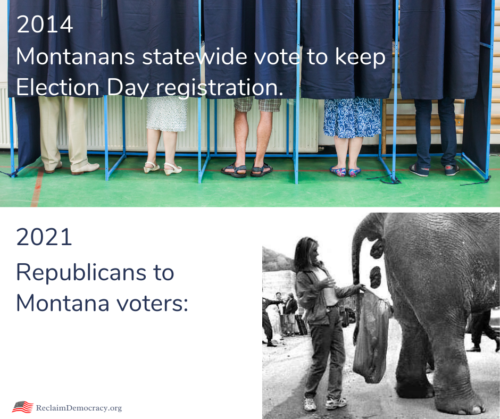By Jeff Milchen
First published by Writers on the Range, March 2021
Colorado’s elections are a bipartisan success story, so when Major League baseball responded to Georgia’s new voting restrictions by moving the All-Star Game to Denver, it made a fine choice.
More than 76% of eligible Coloradans voted in 2020 — second only to Minnesota in statewide turnout. Every registered voter gets a mail-in ballot weeks ahead of election day, there are convenient and safe drop boxes, and in-person voting is also available. People seem to love the choices.
Yet other Rocky Mountain states seem locked in competition to pass the most brazenly anti-democratic election laws.
Montana bills would eliminate Election Day voter registration (now passed) and impose new restrictions on absentee voting. In Wyoming, many lawmakers seek to abolish voting by mail entirely.
Hold my beer, says Arizona. Following Democrats’ success in federal races last fall, GOP legislators unleashed a barrage of bills restricting voting, of which seven are advancing through the legislature. Those measures include requiring absentee voters to get their ballots notarized and banning practices that don’t even exist in Arizona, such as automatic voter registration and Election Day registration.
And in Idaho, GOP state House Majority Leader Mike Moyle said, “Voting shouldn’t be easy,” when introducing a bill to make it a felony to collect and return multiple ballots on behalf of others.
While the most extreme measures may fail, still harmful bills remain, showing the need for federal protection of political rights. U.S. election overseers called November’s contests the most secure in history, yet “stolen election” claims still get pushed to justify rules changes. The first three months of 2021 saw legislators across 47 states introduce more than 360 restrictive bills encompassing dozens of voter suppression tactics.
Obstacles to voting impact people of color most heavily, and in the Interior West, Native Americans are the primary casualty. The 65,000-plus votes cast in the Arizona portion of Navajo Nation overwhelmingly favored President Joe Biden in 2020 and easily exceeded his statewide victory margin. In Tohono O’odham Nation, bordering Mexico, about 90% of ballots went for Biden.
It’s no accident that indigenous voters would be most inconvenienced or deterred by the four Arizona bills that would create new obstacles for absentee voters. The sheer size of the Navajo Reservation — 27,000 square miles spanning three states — makes in-person voting difficult.
Multiple studies have found that mail-in voting has been politically neutral. And despite being dragged down in federal elections last year by a historically unpopular candidate atop the ticket, Republicans dominated state elections and made a net gain in Congressional seats.
Meanwhile, more than 500 state bills were introduced this year to improve voter protections and strengthen procedures, including every West Coast and Plains state but Kansas. Kentucky just proved it possible to pass a bipartisan law that both improves election security and protects voters.
But stopping disenfranchisement of vulnerable groups requires federal reform. For decades, our Voting Rights Act required states with histories of voter suppression to get federal approval for new voting laws, ensuring they had no discriminatory purpose or effect. In practice, the law protected citizens in every state.
In 2006, an overwhelming Congressional majority (and a unanimous Senate) extended the Voting Rights Act for 25 years. But in 2013, Chief Justice John Roberts — who worked to restrict ballot access prior to his judicial career — joined the 5-4 Supreme Court majority to gut key protections of the law.
The ruling enabled states to resume voter suppression tactics, which Texas did within hours.
In response, the House of Representatives recently passed the “For the People Act,” potentially the most important voting rights advance since the 1965 Voting Rights Act. Now in the Senate, the bill would expand and secure ballot access, increase election security and reduce the power of money over elections.
With not a single Republican supporting the House bill, however, the bill is doomed unless the filibuster is ended. Even if the Act passed, one more task remains: passing a constitutional Amendment that embeds an affirmative right to vote and ensures our votes count equally.
For as long as our ability to vote depends on the state we live in, and the political party controlling it, voting is merely a vulnerable privilege, not a right.
Jeff Milchen (@JMilchen) founded Reclaim Democracy!, which works to expand voting rights and democracy nationwide. This commentary appeared in the Salt Lake Tribune, Las Vegas Sun, Anchorage Press, Grand Junction Sentinel, Aspen Daily News, Logan Herald-Journal, Twin Falls Times, Casper Star Tribune, Rock Springs Rocket Miner, Explore Big Sky, Vail Daily, Montrose Daily Press, Delta County Independent, Craig Daily Press, Big Horn County News, St. George Spectrum, Curry Coastal Pilot, Wyofile, Moab Times Independent, Del Norte Triplicate, and Bandon Western World.
Related Pages

